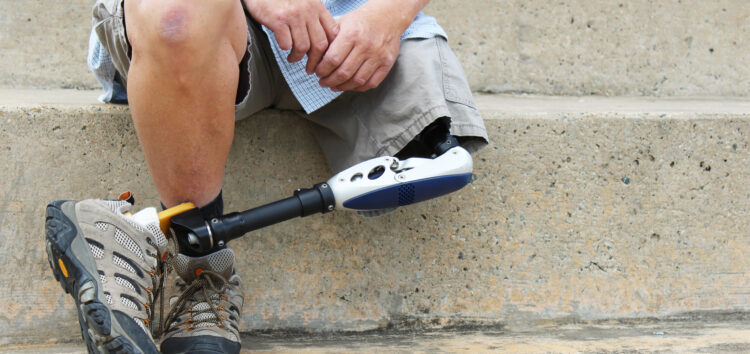Blackwater Law medical negligence solicitors represented Mr Shaw after doctors ignored a blood test which led to necrotising fasciitis and sepsis.
To make a claim for amputation, it is best to speak with an experienced firm of amputation claim solicitors with experience in dealing with these types of claims.
Contents:
- Make a claim for amputation
- What injuries can lead to amputation?
- When could medical negligence lead to an amputation?
- Types of amputation
- Diabetic Amputation Claims
- How much compensation could be received for an amputation?
- How long do I have to make a claim for amputation?
- No Win No Fee amputation claims
- Choosing the right solicitors for your amputation claim
Make a claim for amputation
You can contact our team to find out if you may have a claim, and we can help you begin the process of outlining your claim and requesting any medical records that you may need.
Having to undergo amputation of any limb can be completely life-changing. You could be entitled to an amputation compensation claim if the amputation was required following a serious injury or medical negligence.
Claiming compensation can help you get back on track and pay for ongoing treatment and adaptations to your life, including the need for prosthetic limbs or changes to your home.
What injuries can lead to amputation?
In theory, any incident that results in a catastrophic or serious injury to a limb could result in amputation.
One of the most common accidents that can lead to amputation is road traffic accidents. Often these types of incidents involve severe impact to the body, which can lead to devastating injuries to limbs which then need to be amputated.
Another common cause of amputations is accidents at work, and in particular on construction sites. Heavy equipment and dangerous tools all raise the possibility of a serious accident occurring. Amputation may be required if the limb in question is damaged enough.
If you have been involved in a serious accident that has resulted in amputation, you could make a claim for compensation.
Related Articles
When could medical negligence lead to an amputation?
There are instances where medical negligence can unfortunately lead to a person having to have a part of their body amputated.
Often, amputation in a medical setting is a last resort to stop the spread of infection or disease. However, there will be occasions when amputation is avoidable, so long as the proper medical process has been followed correctly.
Amputations can happen when there has been a negligent failure to treat complications from surgery, diagnose conditions like cancer and sepsis, or fail to properly manage diabetes to name a few. If medical professionals are not quick enough to spot the signs of these conditions, then it can mean that amputation is the only option they are left with.
In addition to delayed diagnosis, errors in surgery and treatment can sometimes mean amputation is necessary if the injury caused is severe enough.

Types of amputation
An infection, disease or injury can result in the following:
- Hand Amputation
- Foot amputation
- Toe Amputation
- Arm Amputation
- Above or below-the-knee amputation
Any amputation can have life-changing effects for the rest of a person’s life and can affect their ability to work and enjoy the things they did before the injury.
Amputation can also go on to have an impact on a person’s life expectancy. Read more in our article on amputation and life expectancy.
Diabetic Amputation Claims
Diabetes can lead to a number of complications, including amputation, which can have a significant impact on your quality of life.
Diabetes is a condition in which your body doesn’t produce enough insulin or use insulin properly. Insulin is an essential hormone which enables your body’s cells to create energy from glucose.
Diabetes UK reports that patients in England undergo more than 7,000 diabetes-related amputations per year, an average of 135 per week, with up to 80% of the cases being avoidable with proper foot care. An NHS Resolution report also cites almost 8,000 diabetic lower limb amputations between 2017-2020.
How does diabetes lead to amputation?
Diabetes can lead to amputation in a few ways. One way is by causing nerve damage. This can reduce feeling in the feet, making it difficult to notice cuts or sores. If a cut or sore is not treated promptly, it can become infected and lead to gangrene. Gangrene is a condition in which the tissues in the body die due to lack of blood flow.
Another way in which diabetes can lead to amputation is by causing poor blood circulation in the feet. This poor blood circulation can make it difficult for the body to heal wounds. If a wound does not heal, it can become infected and lead to gangrene.
Finally, diabetes can also lead to amputation by increasing the risk of blood clots. Blood clots can block the blood supply to the feet entirely, leading to tissue death and gangrene.
How much compensation could be received for an amputation?
As with any claim for medical negligence or personal injury, the amount of compensation that you could receive will entirely depend on the limb that required amputation, and the impact that the amputation has had, and will have on your life moving forward.
If the amputation means that you are no longer able to continue working or continuing in the line of work that you were in prior to the amputation, you could make a claim for loss of earnings to limit the impact of the financial losses.
Your compensation will be broken down into what is known as General Damages and Special Damages. General Damages are compensation for the pain, suffering and loss of amenity that you have endured and include the psychological trauma that often follows a serious injury and subsequent amputation.
Special damages are paid to account for out-of-pocket expenses/financial costs you incur because of the negligent accident or medical treatment, such as the aforementioned loss of earnings, and include ongoing costs to you such as medical costs, the cost of care and assistance and any modifications that are required to your home or vehicle for example.
Compensation for amputation can often command some of the highest payouts for medical negligence and personal injury, due to the catastrophic impact it can have on a person’s life and their family.
How long do I have to make a claim for amputation?
Generally speaking, you have 3 years to bring forward a claim for serious personal injury or medical negligence. This can be 3 years from the incident itself, or if it was not until later that you became aware of negligence, then it is 3 years from the date you became aware of the negligence.
There are some exceptions to this time limit. Notably, if the person in question is under the age of 18, then the 3-year time limit will not begin until they turn 18.
Limitation periods can often be tricky to establish, especially in cases of medical negligence. If you are unsure when your limitation period may have started, your best course of action is to speak with a member of our team who can help you establish a timeline of events.
Amputation Case
No Win No Fee amputation claims
When you call us and receive free initial legal advice, if we believe you or your family member may be entitled to amputation compensation, we will agree to represent you in your claim on a no-win, no-fee basis. This means that there is no risk to you.
If your amputation claim is unsuccessful, you will not have to pay any legal fees. Blackwater Law undertakes all medical negligence and personal injury claims on a no-win, no-fee basis.
Choosing the right solicitors for your amputation claim
It is essential to the success of your amputation claim that you choose the right solicitors.
Having a solicitor that is experienced in dealing with claims like the one you are making, will help to ensure your claim runs as smoothly as possible, and that you are able to secure the maximum amount of compensation for you and your family.
Blackwater Law is ranked by The Legal 500 as a leading provider of legal services for serious personal injury claims and medical negligence claims including amputations. Speak to an experienced member of our team today about your claim and see if you are entitled to compensation.







